Root vegetables are a great addition to any garden. They are easy to grow, and a wide variety of them are available. This type of vegetable grows below the surface, with its roots taking in all the nutrients it needs to thrive. And while many people eat root vegetables daily, they may struggle growing them. So, to ensure you are successful when you try, this post is here to provide some helpful tips for growing root vegetables!
Contents
The Easiest Root Vegetables To Grow
For many gardeners, one of the most rewarding aspects of gardening is harvesting root vegetables they have grown. Home-grown veggies are often fresher and tastier than store-bought ones, but they can also be more nutritious. And while some root vegetables can be challenging to grow, many are relatively easy to cultivate.
One of the easiest root vegetables to grow is the carrot. Carrots are relatively drought-tolerant and can be grown in various soil types. They also have a long growing season, so gardeners can still enjoy a bountiful harvest in cooler climates. Another easy-to-grow root vegetable is the potato. Potatoes are notoriously resilient and can be grown in both warm and cool climates. They also produce many tubers, so even a small potato patch can yield a substantial harvest.
Other easy-to-grow root vegetables include beetroots, turnips, and radishes. These veggies are all relatively fast-growing, so they can be harvested just a few months after planting. And because they don’t require a lot of space, they’re ideal for small gardens or containers. So whether you’re a beginner gardener or an experienced green thumb, there’s sure to be a root vegetable right for you.
Tips For Growing Root Vegetables
While there are many different types of root vegetables, there are also many different ways to grow them. So, whether you’re growing carrots, potatoes, or beetroots, here are a few tips that will help you achieve a bountiful harvest:
Use A Raised Garden Bed
A raised garden bed is the perfect place to grow root vegetables. The soil in a raised bed is loose and well-drained, ideal for roots that need room to grow. In addition, a raised bed can be amended with organic matter to create a rich growing environment. Root vegetables also benefit from consistent moisture, and a raised bed makes it easy to keep the soil evenly moist.
Finally, a raised bed can be built with sloped sides, which makes it easier to harvest root crops. So if you have the option, choose a raised bed when growing root vegetables!
Prepare Your Soil
Before even thinking about planting your vegetables, you must ensure that your soil is up to the task. This is especially true for root vegetables, which rely on healthy soils for nutrition and support. The first step is to check the pH level of your soil. Most root vegetables prefer slightly acidic soils, so you may need to add some lime if your soil is too alkaline.
You’ll also need to ensure that your soil is loose and well-aerated. This will help roots to spread and allow them to access the oxygen they need to grow. Finally, add plenty of organic matter to your soil before planting. This will help to improve drainage and provide essential nutrients for your plants. By preparing your soil, you can ensure that your root vegetables will have a strong foundation for growth.
Choose The Right Variety
One of the most important decisions a gardener can make is choosing the right variety of root vegetables to grow. While some root vegetables, like potatoes, are relatively easy to grow, others, like carrots, can be more finicky. In general, root vegetables fall into one of two categories: those that require deep, loose soil and those that prefer shallow soil. Root vegetables that require deep soil include carrots, parsnips, and turnips. However, these vegetables need loose, well-aerated soil to develop their roots properly.
Shallow-rooted vegetables, such as beets and radishes, can be grown in lighter soils that are less likely to compact. When choosing a root vegetable to grow, it is important to consider the type of soil in your garden and select a variety accordingly. With a little planning, you can ensure that your root vegetables will thrive all season long.
Plant At The Right Time
Most root vegetables are best planted in early spring, as soon as the ground can be worked. This gives them a long growing season to mature before winter sets in. However, some root vegetables, such as carrots and parsnips, taste sweeter if planted in late summer or early fall and are allowed to experience a light frost. If you live in an area with a short growing season, you can start rooting vegetables indoors in pots and transplant them into the garden later.
In general, if you are not sure when the best time to plant is, it’s always best to err on the side of caution and plant a little earlier than you think. This way, you can avoid the risk of your plants being damaged by late frosts or other inclement weather.
Allow For Plenty Of Sun
Most people probably don’t give much thought to the sun when planting their garden. However, the amount of sunlight a plant receives can significantly impact its growth and development. This is especially true for root vegetables, which rely on photosynthesis to produce the energy they need to grow. Therefore, choosing a location that gets plenty of sun throughout the day is important when planting root crops.
Doing so will ensure the plants receive enough light to produce a good harvest. Root crops grown in shady areas tend to be smaller and less productive. So, plant your root vegetables in a sunny spot if you want to get the most out of your garden.
Feed Your Plants
Growing vegetables can be a rewarding experience. Not only do you get to enjoy the fruits of your labor, but you also get to eat healthier and save money. One key to a successful vegetable garden is properly feeding your plants. This is especially important when growing root vegetables, as they are particularly sensitive to nutrients. The best way to ensure that your root vegetables get the nutrition they need is to use a fertilizer with high nitrogen content.
Nitrogen helps to promote leaf growth, which is essential for photosynthesis. It also helps to encourage root growth, resulting in bigger and healthier vegetables. When using nitrogen fertilizer, follow the package directions carefully, as too much nitrogen can damage your plants. With a little care and attention, you can ensure that your root vegetables are healthy and delicious.
Use These Tips When Growing Root Vegetables!
Root vegetables are a great addition to any garden. With a little planning and care, you can ensure that your plants will thrive all season long. And while it may seem like a lot of work, the delicious and nutritious vegetables you’ll get in return will be more than worth the effort. So, whenever you are planning your garden next, make sure to include some root vegetables! And if you have any questions about your specific garden, don’t hesitate to ask your local nursery!






